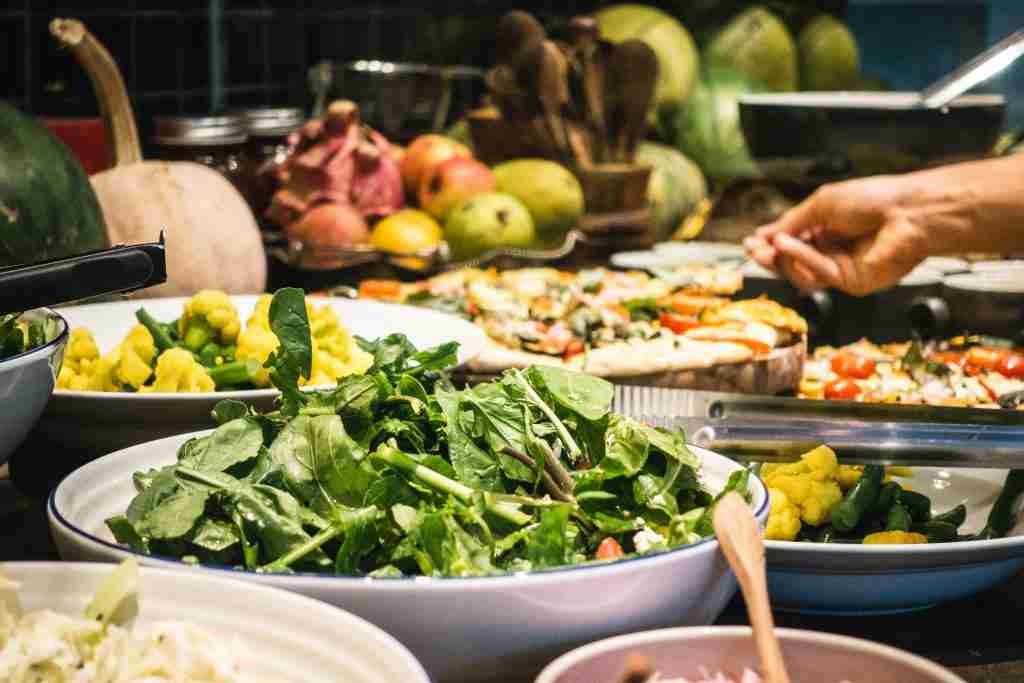
Please note that I am not a medical professional and just sharing techniques and ideas that have worked for us. Always consult with a medical, mental health professional, or dietitian if you feel it is needed.
Disclaimer
Is there a link between anxiety and nutrition? Do you have a child who is dealing with anxiety? Are you looking for ways to help your kid cope and reduce the amount of stress they feel? Nutrition may just be the answer! In this blog post, we’ll explore the connection between nutrition and anxiety in children so that you can make informed decisions about your child’s health.
How Does Nutrition Affect Anxiety?
“About 4% to 10% of US children and adolescents have a diagnosable anxiety disorder.” There is so much that nutrition has to do with how our bodies act and react to certain things. It is becoming increasingly clear that unhealthy dietary patterns can have a negative impact on mental health in children and adolescents. Multiple studies have found a cross-sectional relationship between unhealthy eating habits, such as skipping meals and eating outside of the home, and higher levels of stress and depressive symptoms.
A meta-analysis recently discovered that healthy dietary patterns were significantly associated with fewer internalizing symptoms, particularly depression. Research has also suggested that there is a connection between unhealthy diets, low-quality diets, and depression or poor mental health. In light of this evidence, it is clear that nutrition plays an important role in the mental health of children and adolescents, which is why it is essential to consider the link between anxiety and nutrition when it comes to our younger generations.
Link Between Anxiety and Nutrition: The Gut-Brain Connection
The Gut-Brain Connection is a complex relationship that has been extensively studied in recent years. Numerous studies suggest a bidirectional relationship between a person’s gut and mental health, with an imbalance of gut microbiota being linked to anxiety, depression, and other mental health issues. Harvard Health notes that it can link anxiety to stomach problems. Research has also revealed a connection between gastrointestinal symptoms, autism, heart rate variability, and stress. Probiotics, diet, and zinc-rich foods can all help to alleviate anxiety symptoms. Therefore, it is clear that there is an undeniable link between anxiety and nutrition in children.
Research has proven that there is a link between anxiety and nutrition and what they eat impacts their ability to cope with stress and manage their symptoms. There are some foods to avoid with anxiety. Aspartame, an artificial sweetener commonly found in diet drinks and food, has been linked to an increased risk of developing anxiety behaviors in a new study. When a sample of mice were given free access to water dosed with aspartame equivalent to 15 percent of the FDA’s recommended maximum daily intake, they exhibited anxiety-like behavior. Additionally, aspartame consumption changed neurotransmitter signaling and gene expression in the amygdala, a brain region associated with the processing of fear and emotion.
Serotonin, a neurotransmitter made in the gut, is known to be important for regulating mood and reducing stress levels. This plays an important role in regulating sleep, appetite, mood, and pain. Around 95% of serotonin is produced in the gut, by either microbes or the body’s own cells. It is created from tryptophan, which is an essential amino acid, meaning it cannot be produced by the body and must be obtained through diet. Tryptophan can be found in foods such as dairy products, eggs, fish, meat, nuts, seeds, and soy products.
Studies have shown that increased tryptophan concentration in the gut can lead to increased serotonin synthesis and lower levels of anxiety. Additionally, a mineral deficiency can damage the bacteria in the gut and cause depression and anxiety-like symptoms.
Zinc is an essential mineral to maintain healthy nervous system function, especially looking after the vagus nerve, which connects the brain to the body. Low zinc concentrations have been associated with symptoms of depression and anxiety, and increasing zinc intake has been linked to lowered anxiety levels.
Some foods that reduce anxiety and depression are ones rich in zinc, such as oysters, cashews, liver, beef, egg yolks, legumes, and seeds are all key elements of a well balanced, nutrient-dense diet that can help improve mental wellbeing and reduce anxiety in children.

Therefore, enhancing your child’s diet with foods rich in antioxidants, zinc-rich foods and other vitamins and minerals may help reduce the symptoms of anxiety disorders. Additionally, understanding the gut-brain connection and how nutritional shortfalls can influence mental health can equip you with the necessary tools to ensure your child is getting the nutrition he or she needs for optimal mental health.
Having some anxiety is an inevitable part of life, but by providing our children with the right tools to manage it, including a healthy diet, we can help them cope with the daily stresses they may face. Eating a balanced diet can help improve mood, reduce inflammation and support overall physical and mental well-being, which are all key factors in managing anxiety. In my latest post, I share strategies for dealing with anxiety when it arises. Check it out!
Anxiety Diet and Exercise Plan
Day 1:
- Breakfast: Scrambled eggs with spinach and tomatoes
- Lunch: Grilled chicken breast with sweet potato and steamed broccoli
- Dinner: Salmon with quinoa and sautéed kale
Day 2:
- Breakfast: Greek yogurt with mixed berries and a sprinkle of chia seeds
- Lunch: Turkey and avocado lettuce wrap with carrot sticks
- Dinner: Beef stir-fry with bell peppers and onions, served with brown rice
Day 3:
- Breakfast: Oatmeal with almond milk, banana, and a sprinkle of cinnamon
- Lunch: Lentil soup with a side salad of mixed greens
- Dinner: Grilled shrimp with roasted cauliflower and broccoli
Day 4:
- Breakfast: Smoothie bowl with frozen berries, Greek yogurt, and a sprinkle of hemp seeds
- Lunch: Tuna salad with mixed greens and whole wheat crackers
- Dinner: Baked chicken with roasted vegetables
Day 5:
- Breakfast: Whole grain toast with almond butter and jelly and sliced banana
- Lunch: Turkey and cheese wrap with cucumber slices and cherry tomatoes
- Dinner: Vegetable and bean chili with a side of quinoa
Exercise has been shown to have a number of benefits for the brain, including:
- Improving mood: Physical activity can increase the production of endorphins, also known as “feel-good” chemicals in the brain, which can help to reduce feelings of anxiety and depression.
- Enhancing cognitive function: Exercise has been shown to improve memory, attention, and executive function (such as planning, problem-solving, and decision-making) in both children and adults.
- Promoting neuroplasticity: Exercise has been found to stimulate the growth of new brain cells, a process known as neurogenesis, and promote the growth of new neural connections, a process known as neuroplasticity, which can help to improve cognitive function.
- Reducing the risk of brain diseases: Regular physical activity has been found to reduce the risk of developing neurodegenerative diseases such as Alzheimer’s and Parkinson’s.
- Supporting brain development in children: Regular physical activity has been found to support brain development in children, by improving cognitive function and academic performance.

The combination of exercise with other activities such as meditation, yoga, or mindfulness can have a greater impact on mental well-being. Ensure your kiddos are drinking enough water throughout the day and during exercises. The exercising does not have to be lengthy or strenuous, the point is to just get moving. See the example plan for a simple week of exercises to do with your kids. Check out my other posts!
Day 1:
- 10-minute walk around the neighborhood
- 3 sets of 5 deep belly breaths
Day 2:
- 15-minute yoga session (try finding a kid-friendly video on YouTube, Cosmic Kids Yoga is a favorite here!)
- 5 minutes of quiet time for relaxation and mindfulness
Day 3:
- 20-minute bike ride or scooter ride
- 5-minute progressive muscle relaxation exercise
Day 4:
- 10-minute jog or run around the park
- 5 minutes of guided meditation or visualization
Day 5:
- 25-minute swimming session or water play
- 5 minutes of gratitude journaling

Are there any supplements or vitamins that have been found to be beneficial for children with anxiety?
There is some research suggesting that certain supplements and vitamins may be beneficial for children with anxiety. However, it is important to note that these supplements should not be used as a substitute for professional treatment and should always be taken under the guidance of a healthcare professional.
Omega-3 fatty acids: Omega-3 fatty acids, found in fish oil and certain plant sources, have been shown to have anti-inflammatory properties and may help to reduce anxiety symptoms in children.
Vitamin D: Vitamin D deficiency has been linked to an increased risk of anxiety, and supplementing with vitamin D has been found to have a positive effect on reducing anxiety symptoms in children.
Magnesium: Magnesium is a mineral that plays an important role in brain function and has been found to be helpful in reducing anxiety symptoms in children.
Probiotics: Probiotics, which are beneficial bacteria found in fermented foods and supplements, have been found to have a positive effect on reducing anxiety symptoms in children by promoting a healthy gut microbiome.
L-Theanine: L-Theanine is an amino acid that can be found in tea leaves, and it has been found to have a calming effect on the brain, reducing anxiety symptoms.
It is important to note that the results of these supplements may vary from child to child, and it’s important to consult with a healthcare professional before starting any supplement regimen. Also, it’s important to note that supplements are not regulated by the FDA as they are not considered drugs, therefore, their quality, purity, and potency can vary.
How can parents address picky eating in children with anxiety?
Picky eating in children can be a common issue, and it can be even more challenging for parents of children with anxiety. Here are a few strategies that parents can use to address picky eating in children with anxiety:
Create a calm and relaxed atmosphere at mealtime: Children with anxiety may feel more comfortable in a relaxed and calm environment, so try to create a peaceful atmosphere at mealtime. Avoid distractions and noise, and encourage conversation and positive interactions.
Introduce new foods gradually: Children with anxiety may be more resistant to trying new foods, so it’s important to introduce new foods gradually and in small amounts. This can help to reduce anxiety and make the process less overwhelming.
Get children involved in meal planning and preparation: Allowing children to have a say in what they eat can help them to feel more in control and less anxious. Encourage them to help plan meals, choose recipes, and participate in food preparation.
Make food fun: Make mealtime fun by using different colors, shapes, and textures to make food more appealing. Using cookie cutters to cut food into fun shapes, or allowing children to create their own “food art” can make mealtime more enjoyable.
Be patient and persistent: Children with anxiety may take longer to try new foods, so it’s important to be patient and persistent. It may take multiple exposures before a child is willing to try a new food, so be prepared to offer new foods multiple times.
Seek professional help: If your child’s picky eating is causing significant stress and affecting their overall health, it’s important to seek professional help. A dietitian or feeding therapist can work with you and your child to create a personalized plan to address picky eating.
It’s important to remember that picky eating is a common issue, and it is not necessarily a sign of a larger problem. With patience, persistence and a positive attitude, parents can help their children with anxiety to develop healthy eating habits and improve their overall health.



